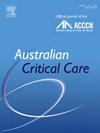Adverse events during and after early mobilisation: A post hoc analysis of the TEAM trial
IF 2.7
3区 医学
Q2 CRITICAL CARE MEDICINE
引用次数: 0
Abstract
Background
The Treatment of Mechanically Ventilated Adults with Early Activity and Mobilisation (TEAM) trial reported a higher occurrence of adverse events with greater mobilisation. However, their timing and nature remained unexplored. We conducted an in-depth exploration of such events.
Objective
The purpose of this paper is to thoroughly examine the timing and characteristics of adverse events reported within the TEAM trial.
Methods
Adverse event data were collected daily in real time. Categorical data were compared using the Fisher's exact test. The relationship between adverse events and patient survival was analysed using a Cox-regression frailty model.
Results
Overall, 37 out of 371 patients (10.0%) in the early mobilisation group and 16 out of 370 patients (4.3%) in the usual care group experienced adverse events, with 71 events in the early mobilisation group compared to 24 events in the usual care group. The most common adverse events were altered blood pressure in 21 out of 53 patients (39.6%), arrhythmia in 17 out of 53 patients (32.1%), and oxygen desaturation in nine of 53 patients (17.0%). Patients with an adverse event were more likely to have congestive heart failure (absolute percentage difference: 16.1, 95% confidence interval [CI]: 6.1 to 26.1), peripheral vascular disease (absolute percentage difference: 6.4, 95% CI: 1.3 to 11.5), heart attack (absolute percentage difference: 13.5, 95% CI: 5.9 to 21.1), or stroke (absolute percentage difference: 9.3, 95% CI: 3.5 to 15.1). Adverse events occurred at a median of 4 days with early mobilisation and 7 days with usual care. There was no significant difference in survival for patients who experienced an adverse event compared to those without an adverse event.
Conclusion
Adverse events were more common in patients randomised to early active mobilisation, were cardiovascular and respiratory in nature, tended to occur earlier with active mobilisation, and cardiovascular comorbidities were more common in such patients. This information can help guide future studies in this field.
Trial registration
TEAM ClinicalTrials.gov number, NCT03133377, registered 28 April 2017.
早期动员期间和之后的不良事件:TEAM试验的事后分析。
背景:机械通气成人早期活动和活动治疗(TEAM)试验报道,活动越大,不良事件的发生率越高。然而,它们的时间和性质仍未被探索。我们对这类事件进行了深入调查。目的:本文的目的是彻底检查在TEAM试验中报告的不良事件的时间和特征。方法:每日实时收集不良事件资料。分类数据采用Fisher精确检验进行比较。使用Cox-regression脆弱模型分析不良事件与患者生存之间的关系。结果:总体而言,早期动员组371例患者中有37例(10.0%)和常规护理组370例患者中有16例(4.3%)出现不良事件,早期动员组有71例事件,而常规护理组有24例事件。最常见的不良事件是53例患者中21例血压改变(39.6%),53例患者中17例心律失常(32.1%),53例患者中9例氧饱和度过低(17.0%)。有不良事件的患者更有可能发生充血性心力衰竭(绝对百分比差:16.1,95%可信区间[CI]: 6.1至26.1)、周围血管疾病(绝对百分比差:6.4,95% CI: 1.3至11.5)、心脏病发作(绝对百分比差:13.5,95% CI: 5.9至21.1)或中风(绝对百分比差:9.3,95% CI: 3.5至15.1)。不良事件发生的中位时间为早期活动4天,正常护理7天。与没有不良事件的患者相比,有不良事件的患者的生存率没有显著差异。结论:随机分配到早期主动活动组的患者的不良事件更常见,主要是心血管和呼吸系统的不良事件,积极活动组的不良事件往往发生得更早,心血管合并症在这类患者中更常见。这些信息可以帮助指导该领域未来的研究。试验注册:TEAM ClinicalTrials.gov号码:NCT03133377,注册于2017年4月28日。
本文章由计算机程序翻译,如有差异,请以英文原文为准。
求助全文
约1分钟内获得全文
求助全文
来源期刊

Australian Critical Care
NURSING-NURSING
CiteScore
4.90
自引率
9.10%
发文量
148
审稿时长
>12 weeks
期刊介绍:
Australian Critical Care is the official journal of the Australian College of Critical Care Nurses (ACCCN). It is a bi-monthly peer-reviewed journal, providing clinically relevant research, reviews and articles of interest to the critical care community. Australian Critical Care publishes peer-reviewed scholarly papers that report research findings, research-based reviews, discussion papers and commentaries which are of interest to an international readership of critical care practitioners, educators, administrators and researchers. Interprofessional articles are welcomed.
 求助内容:
求助内容: 应助结果提醒方式:
应助结果提醒方式:


